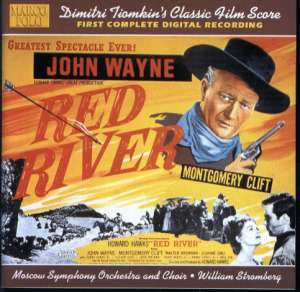************************************************************** EDITOR’s RECOMMENDATION May 2003 **************************************************************
Red River
Music by Dimitri Tiomkin
Available on Marco Polo 8.225217
Running Time: 64:10
Crotchet

Marco Polo’s Classic Film Score series has, at last, caught up with the very significant Golden Age of Film Music contribution of Dimitri Tiomkin. Although Red River (independently produced and directed by Howard Hawkes, starring John Wayne and Montgomery Clift and released by united Artists in 1948) is undeniably one of Tiomkin’s great western scores, it is a pity that Messrs Morgan and Stromberg should choose it to open what I fervently hope will be a Dimitri Tiomkin film score series, when there are so many others for which there are no recordings (other than in some case unauthorised pirated albums) of such towering scores as: The High and the Mighty and Land of the Pharaohs; and the fact that the main themes of Red River have already been recorded, in 1980, by Laurie Johnson conducting the London Studio Orchestra and the John McCarthy Singers on Unicorn-Kanchana UKCD2011. [In passing I will confess this is one of my very favourite film music albums. Named ‘The Western Film World of Dimitri Tiomkin’, it also contains big beefy performances of Tiomkin’s music from: High Noon, Duel in the Sun, Giant, Night Passage, and Rio Bravo].
Having said all that, the Marco Polo team must be congratulated on presenting the complete Red River score in all its richness and excitement.
Much has been commentated on the fact that Russian-born Dimitri Tiomkin saw the great American western open spaces as very much akin to the vastness of the Russian Steppes, and wrote accordingly. And yet, I can’t help wondering how well this Red River music would fit a similar story set in Russia; somehow there is something undeniably American here. Nevertheless, the Moscow Symphony Orchestra rise magnificently to the very considerable challenges of Tiomkin’s music with its constantly shifting time signatures and often violently changing cross-rhythms. They give this heroic, thoroughly masculine music a really muscular reading. The weak link in this recording is the Moscow choir - their voices are woolly, it is almost impossible to hear a word they are singing beyond "Settle down, little doggies." - and even that is none to clear. For greater, although not complete clarity, one has to turn to the earlier Laurie Johnson recording which comprised powerful, and, on balance, better performances of three major cues: ‘Prelude and Wagon Train’, ‘Red River Crossing’ and ‘The Challenge and Finale’ Regarding the latter cue Johnson is more concerned with the listening experience and he screws up and maintains the tension more effectively than Stromberg who follows much more faithfully the on-screen scoring.
John Morgan’s Red River score restoration presents some excellent material: the horror and ferocity of ‘Stampede’, the tenderness of ‘Fogy Night Surrender’ and the jubilation of the ‘Approach to Abilene’ to mention only a few of the stand-out numbers in this 37-cue album. The accompanying sumptuously illustrated 32 -page booklet contains a full cue-by-cue analysis and commentaries about the film and Tiomkin’s career.
Big, beefy, heroic western music to excite and raise the spirits. An auspicious start to what one hopes will be a memorable Dimitri Tiomkin classic film scores series.
Ian Lace
41/2
Gary Dalkin adds:-
I have to agree with Ian about the terribly woolly recording of the choir, but otherwise this is a significant album of a major score. The booklet is nicely illustrated, though I do have to take exception to some of the most hyperbolic and questionable liner notes - by Jack Smith - I have encountered. Smith's claim that Red River is "arguably the greatest" of the three greatest American Western scores (the others being cited as The Searchers (Max Steiner) and How The West Was Won (Alfred Newman)) is simply a matter of opinion most of us who have heard The Magnificent Seven (Bernstein), The Big Country (Moross) or Tombstone (Broughton) would disagree with. Claims that the score significantly advanced the art of film music over anything previously achieved before might come as news to those familiar with King Kong (Steiner), Citizen Kane (Herrmann) or The Lost Weekend (Rózsa). The suggestion that director Howard Hawks made "color tests" but shot in monochrome because "he preferred a more realistic look in black and white" contradicts the commonplace observation that reality is in colour.
However, the claim that the release of music from Red River on a set of three 78rpm records was "an unprecedented event for the times" is simply wrong. Sets of 78s were issued from Sir Arthur Bliss' Things to Come score in 1936, while a set from Miklós Rózsa's Jungle Book appeared in 1942. By 1948 such releases were almost expected practice in Britain, that year seeing the issue of 78's from Vaughan Williams Scott of the Antarctic, Easdale's The Red Shoes and Bliss' Oliver Twist. The previous year there had been releases from While I Live by Charles Williams and Nicholas Nickleby by Lord Berners, while 1946 had seen issues from Men of Two Worlds, Arthur Bliss, and The Overlanders, John Ireland. This is not by any means an exhaustive list of contemporary 78rpm issues of film music. But then Smith posits such irrelevant opinions as Hawks "was drinking buddies with the two greatest authors of the twentieth century, Hemingway and Faulkner". Such facile commentary does an album of this calibre and a label such as Marco Polo no credit whatsoever.
Gary Dalkin
4
Return to Index